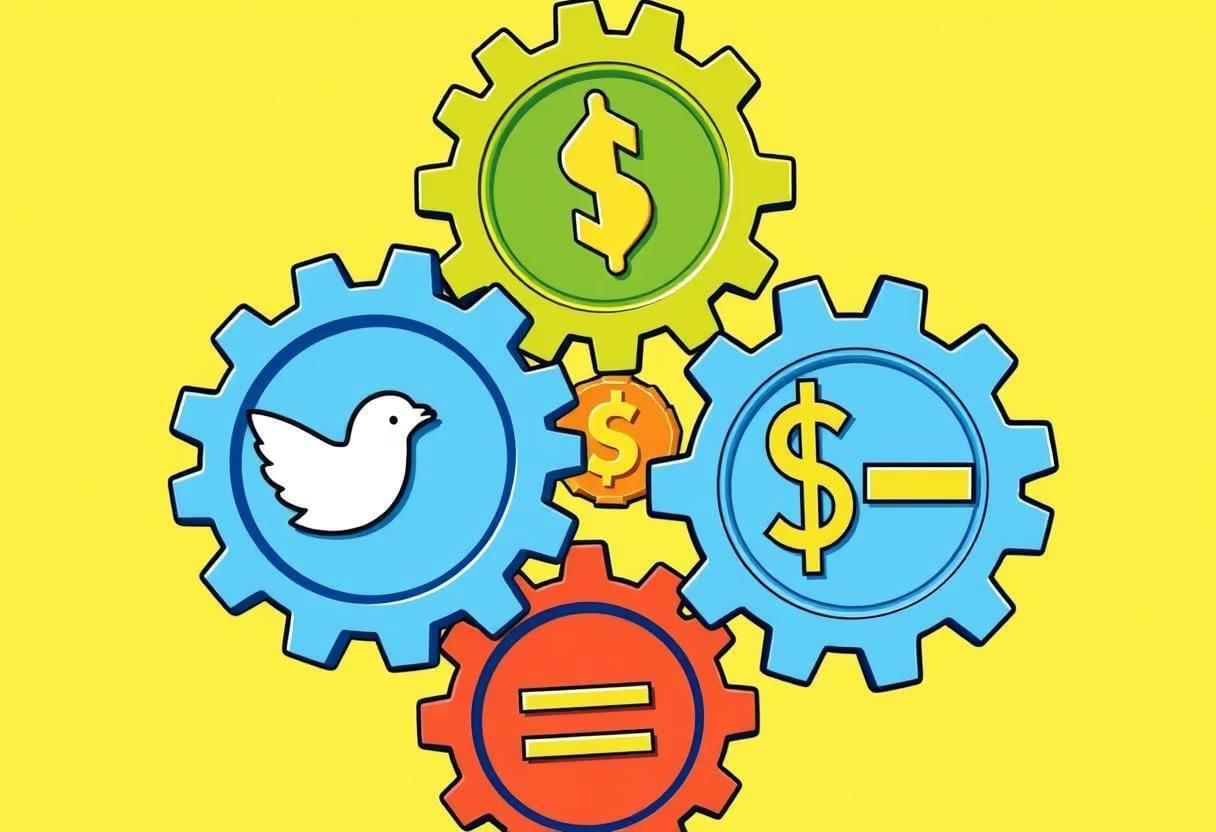O P Gauba Summary: Concept of Ideology-2 | PSIR Optional for UPSC PDF Download
Introduction
The current debate on ideology seeks to demonstrate the superiority of the liberal-democratic system, both in theory and practice. In today’s world, there is a growing demand for liberalisation, privatisation, and globalisation, making this concept increasingly relevant. However, it requires careful examination. The collapse of socialism in various parts of the world cannot be attributed solely to human errors in its implementation, as this overlooks the complex socio-economic factors involved. Moreover, the Western democratic model does not necessarily embody the ideal standards of justice and morality. Achieving human emancipation is a multifaceted process, and there are no straightforward solutions to all human problems. In formulating their resolutions, it is crucial to consider relevant ideas from a range of ideologies, including liberalism, Marxism, socialism, fascism, anarchism, Gandhism, and feminism.
Basic Principles of Liberalism
Liberalism is a political philosophy that places the highest importance on individual liberty as the main goal of public policy. Here, liberty refers to freedom from restrictions, particularly those imposed by an authoritarian state. This principle originated in the West during the late seventeenth century as a means to dismantle the feudal privileges of the land-owning class and create an environment conducive to the new entrepreneurial class, enabling them to contribute to social progress.
Authoritarian State
An authoritarian state is characterized by the concentration of power in the hands of an individual, a group, an institution, or a set of rules derived from a sacred text. In such a system, this source of authority is regarded as the legitimate power, and its commands or directives must be followed by everyone without question.
Liberalism
Liberalism is not a strict ideology but an intellectual movement open to new ideas for addressing emerging situations and challenges. Its core principles include:
- The potential of rational individuals to contribute to social progress and their own well-being.
- The recognition that while individual self-interest and the common good are not fundamentally opposed, conflicts can arise.
- The existence of natural rights that cannot be infringed upon by any authority.
- The view of civil society and the state as artificial institutions created to serve the common interest, with the right to demand obedience from individuals.
- The importance of proper procedures in the liberal understanding of freedom, equality, justice, and democracy.
- The support for individual civil liberties, including freedom of thought, expression, association, movement, and personal freedom, with limitations aimed at ensuring equal freedom for others.
 Liberty and Rights
Liberty and Rights
Liberalism advocates for the principle of freedom of contract, emphasizing that no one should be bound by an obligation without their own consent and the consideration of mutual benefit.
- The role of the state is that of an umpire, ensuring the enforcement of contracts.
- Contracts that are formed under duress or that undermine a person’s dignity are deemed void.
Liberalism posits that public policy should emerge from voluntary negotiations among groups of individuals pursuing common interests.
Liberalism and the Role of the State
- In essence, liberalism views market society as the preferred mode of social organization.
- The state’s function is confined to safeguarding individuals’ lives and property, upholding contracts, and delivering basic services that private enterprises would not provide.
- While acknowledging the necessity of the state, liberalism advocates for its limited authority.
- The state is perceived as a tool for achieving individual goals, with individuals being the focal point, thereby rejecting any notion of absolute state power.
Early Exponents of Liberalism
- Prominent early advocates of liberalism include John Locke (1632-1704), Adam Smith (1723-90), and Jeremy Bentham (1748-1832), all of whom were English philosophers.
- Locke is regarded as the father of liberalism, Smith as the father of economics, and Bentham as the founder of utilitarianism.
- These thinkers defended the concept of laissez-faire, advocating for minimal state interference in individuals’ economic activities, and are considered the pioneers of classical liberalism, which emphasizes limited government intervention.
- In the twentieth century, Herbert Spencer (1820-1903), also an English philosopher, aimed to reaffirm negative liberalism by applying principles of natural science to social organization.
A state that provides for various types of social services for its citizens
Social services offered by the state include:
- Social security: Financial assistance during job loss, death of the primary earner, long illness, disability, or other crises.
- Free education: Access to education without cost.
- Public health: Health services and facilities provided by the government.
- Poor relief: Support for individuals and families in poverty.
- Supply of essential goods and services at subsidised rates: Provision of necessary items like food grains, milk, fuel, and transport at reduced prices.
Cultural heritage protection includes:
- Monuments: Preservation of historical sites.
- Museums: Protection and promotion of cultural and historical artifacts.
- Libraries: Safeguarding and promoting literary resources.
- Art galleries: Preservation and promotion of visual arts.
- Botanical gardens: Protection of plant diversity and education on flora.
- Zoological parks: Conservation of animal species and education about wildlife.
- Other cultural institutions: Various other entities that promote and preserve cultural heritage.
The state also promotes higher education and scientific research to foster intellectual and cultural growth in society.
Philosophical Foundations of the Welfare State
John Stuart Mill, an English philosopher, sought to refine utilitarianism and laissez-faire, contributing to the welfare state's theoretical framework. T.H. Green introduced a moral dimension to liberalism, furthering the welfare state concept. This progression was supported by later philosophers like L.T. Hobhouse, Harold J. Laski, and R.H. Tawney, making early twentieth-century England a hub for welfare state theory and practice. This approach, known as positive liberalism, advocates for an active state role in ensuring a dignified life for all citizens.
Political and Economic Aspects
Politically, liberalism promotes democracy, while economically, it endorses capitalism. Democracy aims to fulfill the needs and wants of the public, but capitalism can lead to economic power being concentrated in the hands of a few. This concentration is a concern, but there are various ways to address it. The welfare state is designed to correct this imbalance, ensuring a more equitable distribution of resources and opportunities.
Streams of Liberal Thought
Individualism Utilitarianism
Early liberal theory developed in two main directions:
Individualism
Individualism puts emphasis on the concept of individuals as rational beings. It highlights the importance of recognizing each person's dignity, independence, and judgment in public policy and decision-making. The core idea is that no individual should be made to suffer for the benefit of a larger group.
- According to individualism, only individuals possess rights. Entities such as families, trade unions, corporations, or the state cannot have rights that are separate from the rights of their individual members.
- Similarly, no social unit can have interests that are not distinguishable from the interests of its individual members. Individualism advocates for a social and legal system based on voluntary interactions between individuals.
- This perspective strongly supports the model of a market society and argues that even taxation should be limited to providing and maintaining common services.
- Notable figures associated with individualism include John Locke and Adam Smith.
Utilitarianism
Utilitarianism is based on the principle of the "greatest happiness for the greatest number." This idea suggests that the interests of a few may be sacrificed for the greater good. Happiness, in this context, is understood as the balance of pleasure over pain derived from various goods, services, actions, and policies.
- The founder of utilitarianism, Jeremy Bentham, believed that human behaviour is driven by the desire to seek pleasure and avoid pain. Therefore, moral principles and state policies should aim to promote the "greatest happiness for the greatest number." Bentham did not differentiate between the qualities of different pleasures; he focused on maximizing the quantity of pleasure.
- John Stuart Mill later acknowledged that there are qualitative differences among pleasures, recognizing that individuals have varying tastes. He also emphasized individual liberty as the highest value. Mill's modifications to utilitarianism brought it closer to individualism and changed its fundamental nature. Additionally, he advocated for taxing the rich to assist the poor, laying the groundwork for the welfare state.
Neo - Liberalism
Neo-liberalism, also referred to as neo-classical liberalism or libertarianism, is a contemporary iteration of classical liberalism that seeks to restore laissez-faire individualism. This ideology critiques the welfare state and opposes government intervention in economic activities. Proponents of neo-liberalism advocate for a reduction in the state's role, which has significantly expanded its reach over time.
Philosophical Foundations
During the latter half of the twentieth century, influential thinkers like F.A. Hayek, Milton Friedman, and Robert Nozick argued that the welfare state undermines individual liberty by coercively transferring resources from the more capable to the less capable. To restore individual liberty, they aimed to revitalise the principle of laissez-faire across economic, social, and political realms.
- Neo-liberalism promotes complete autonomy and freedom for individuals, advocating for freedom from institutions that limit personal perspectives, such as religion, family, and social customs.
- It rejects the deterministic view of human life, asserting that a person's character and actions are not merely shaped by their circumstances, but that individuals are the architects of their own destinies.
- Furthermore, neo-liberalism opposes all forms of social and legal restrictions on an individual's freedom of action. In the political sphere, it emphasises the need to liberate economic activities from all constraints to enable individuals to achieve true progress and sustainable prosperity.
Neo-Liberal Beliefs in 'Spontaneous Order' and Market Primacy
Neo-liberals are firm believers in the idea of 'spontaneous order' that arises from human relationships, particularly as demonstrated in free markets. They are critical of any political approach, especially socialism, that claims to have a complete understanding of human needs, arguing that no government can possess such comprehensive knowledge.
Human needs emerge from countless unpredictable interactions among individuals living in a free or open society. When the government attempts to regulate these interactions, it restricts freedom without necessarily meeting real needs. Therefore, neo-liberals advocate for leaving these decisions to the market, which is expected to expand choices for individuals.
In the economic realm, while the market can function within a democratic framework, it does not inherently represent democracy. In the political context, the market exemplifies true democracy, where votes are exchanged for welfare benefits, and the costs are borne by the most productive members of society.
A Critical Appraisal
Liberalism is indeed a flexible political philosophy that has evolved to meet the changing demands of society. However, like any ideology, it has not adequately addressed the challenges confronting humanity. In fact, liberalism has held onto capitalism so tightly that its new initiatives appear to be merely novel ways of supporting or justifying the capitalist system.
Liberalism's Bourgeois Roots
Liberalism was born to safeguard the interests of the bourgeoisie (the capitalist class) when political authority was dominated by feudal interests. In its formative years, liberalism championed the idea of limiting state power in favour of laissez-faire individualism, minimal government intervention, and minimal regulation. In advocating for this policy, liberalism focused so heavily on the freedom of the property-owning class that it overlooked broader human considerations. As R.H. Tawney observed in his book The Acquisitive Society (1920),
The Conflict Between Humanitarian Concerns and Property Rights
The conflict between humanitarian concerns and the concept of property rights has been ongoing since the eighteenth century. This struggle is evident in various issues such as:
- Legislation regarding factories
- Reforms in housing
- Regulation of adulteration in goods
- Mandatory sanitation of private residences
There are instances when the right to property is considered inviolable, even though it contributes to significant social and economic disparities and causes indignities and injustices to many individuals.
Actual Imbalance of Group Interests
After the French Revolution in 1789, with the rise of the bourgeoisie, liberalism started to advocate for an expanded role of the state and increased regulations. However, the concept of the welfare state did not emerge out of genuine concern for vulnerable groups like peasants, workers, and ordinary people. Instead, it aimed to secure their support to preserve the existing social order. As a result, liberalism effectively upholds a capitalist system or a mixed economy that allows the bourgeoisie to maintain their economic and political dominance.
The strategy of gradual change, which involves making small, continuous concessions to the lower classes, is strategically designed to manage discontent and prevent the rise of revolutionary movements. Consequently, the welfare state often creates an illusion of welfare rather than genuinely providing it.
Contemporary Liberalism
 Political Ideologies
Political Ideologies
Contemporary liberalism advocates for representative democracy with the belief that the state represents the interests of all societal groups and helps mediate conflicting interests. However, this notion is not universally applicable, especially in developing countries where various groups may not be equally aware of their interests, organized, or vocal. Often, these nations are influenced by vested interests. For instance, in India, certain business interests are well-organized while many consumers lack representation. As a result, even when decisions are made by representative institutions, there is often an imbalance in the protection of different groups' interests.
Contribution of Liberalism
The most significant contribution of liberalism is its role in shifting from traditionalism to modern rationalism. Essentially, it argued that social and economic relationships among people, which were once based on tradition, should now be grounded in reason. This shift was initially propelled by the emerging middle class—merchants and industrialists—who were the first to benefit from it. Feudalism was replaced by capitalism, not merely in economic terms but also politically. However, this transition had adverse effects, leading to deteriorating conditions for the working classes as classical liberalism advanced. Once the shift towards defining social relations based on 'reason' began, it became inevitable, paving the way for the rise of socialism. Socialism aimed to improve the plight of the working class by applying the same principle of 'reason' that liberalism had first introduced. The belief in 'reason' is a potent force. Consequently, liberalism evolved when confronted with new challenges, leading to fresh perspectives on the principles of freedom, equality, justice, democracy, progress, and other human values.
Liberalism in Context
 Political Economy
Political Economy
Liberalism is currently discussed in two main contexts:
a ) As a theory of capitalism, where it supports the economic relations of capitalist society.
b ) As a theory of constitutionalism, which involves setting appropriate limitations on political power.
When liberalism is viewed as a theory of capitalism, it often encounters inherent contradictions that can only be resolved by appealing to human values. However, when it is used as the basis for constitutionalism and the limitation of political power, it reflects enduring political principles and is likely to persist in this area.
Constitutionalism
Constitutionalism is the principle that requires the organization and operation of the state to be in accordance with a constitution. This ensures that no organ or office-holder of the state can exercise arbitrary power. A constitution not only establishes a framework for government but also defines the powers of different government organs and the limits on those powers.
|
173 videos|574 docs|148 tests
|
FAQs on O P Gauba Summary: Concept of Ideology-2 - PSIR Optional for UPSC
| 1. What are the basic principles of liberalism? |  |
| 2. How does neo-liberalism differ from classical liberalism? |  |
| 3. What is meant by 'spontaneous order' in neo-liberal beliefs? |  |
| 4. What is the conflict between humanitarian concerns and property rights in liberalism? |  |
| 5. How does contemporary liberalism address current global issues? |  |
















